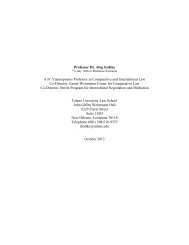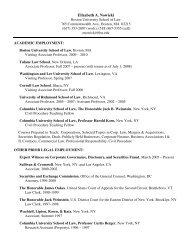Civil Codes of Louisiana - Tulane Law School - Tulane University
Civil Codes of Louisiana - Tulane Law School - Tulane University
Civil Codes of Louisiana - Tulane Law School - Tulane University
Create successful ePaper yourself
Turn your PDF publications into a flip-book with our unique Google optimized e-Paper software.
Winter 2008 The <strong>Civil</strong> <strong>Codes</strong> <strong>of</strong> <strong>Louisiana</strong> 18<br />
The <strong>Civil</strong> Code <strong>of</strong> <strong>Louisiana</strong> is the most important contribution <strong>of</strong><br />
<strong>Louisiana</strong> to an American culture. It possibly is the most important<br />
accomplishment in the history <strong>of</strong> American law in the sense <strong>of</strong> the<br />
relation it bears to the future direction <strong>of</strong> American law… It is a rather<br />
grim commentary on our historians that the significance <strong>of</strong> the <strong>Louisiana</strong><br />
<strong>Civil</strong> Code has been completely overlooked . . . As a cultural document,<br />
the <strong>Civil</strong> Code has its own merit. It is beautifully written, so carries the<br />
best tradition <strong>of</strong> civilian aesthetics. 48<br />
54 It has been pointed out that the decision <strong>of</strong> the United States Supreme Court<br />
in Bender v. Pfaff, 49 grounded on <strong>Louisiana</strong> community property law, led the<br />
federal government to the adoption <strong>of</strong> the joint return as the mode for the income<br />
taxation <strong>of</strong> spouses. 50 As late as 1990, a spouse argued before the United States<br />
Tax Court that New Mexico had adopted as part <strong>of</strong> its law the <strong>Louisiana</strong> law <strong>of</strong><br />
usufruct, and that, therefore, a surviving spouse is entitled to QTIP marital<br />
deduction. 51 The court denied the claim, but remedial state legislation may be<br />
forthcoming to secure the QTIP for citizens <strong>of</strong> New Mexico.<br />
F. Revision <strong>of</strong> the <strong>Louisiana</strong> <strong>Civil</strong> Code <strong>of</strong> 1870<br />
55 The question <strong>of</strong> the desirability <strong>of</strong> codification is by no means settled in<br />
comparative legal theory. In <strong>Louisiana</strong>, however, this question was answered in<br />
the affirmative more than a century and a half ago when the legislature adopted<br />
the <strong>Civil</strong> Code <strong>of</strong> 1808, and again in 1825 and 1870 on the occasion <strong>of</strong> the<br />
revision <strong>of</strong> the <strong>Civil</strong> Code. The tradition <strong>of</strong> codified laws is thus firmly<br />
established in the state, and what may be still controversial is the desirability <strong>of</strong> a<br />
new revision <strong>of</strong> the already twice revised <strong>Civil</strong> Code.<br />
56 The arguments against revision are many and complex, most <strong>of</strong> them<br />
deserving attention and discussion. The motivating forces behind these<br />
arguments, however, have not as yet been fully articulated, although<br />
traditionalism and excessive reverence for the personalities <strong>of</strong> the men who<br />
shaped the <strong>Louisiana</strong> civil law system appear to be at the basis <strong>of</strong> most objections<br />
to revision. The redactors <strong>of</strong> the <strong>Civil</strong> Code have, indeed, produced a text that has<br />
proved both functional and durable. As a product <strong>of</strong> its era, the <strong>Louisiana</strong> <strong>Civil</strong><br />
Code has been justly considered to be an achievement <strong>of</strong> juridical craftsmanship<br />
and has been hailed as<br />
48 Mitchell Franklin, Book Review, 7 TUL. L. REV. 632, 633 (1933) (reviewing BENJAMIN W.<br />
DART, CIVIL CODE OF THE STATE OF LOUISIANA (1932)). See also Roscoe Pound, The Influence <strong>of</strong><br />
the <strong>Civil</strong> <strong>Law</strong> in America, 1 LA. L. REV. 1, 16 (1938).<br />
49 282 U.S. 127, 51 S. Ct. 64 (1930). The court held that marital income in <strong>Louisiana</strong> could not be<br />
taxed wholly to the husband but should be divided equally between the spouses and taxed<br />
accordingly.<br />
50 See John H. Tucker, Jr., The Code and the Common <strong>Law</strong> in <strong>Louisiana</strong>, 29 TUL. L. REV. 739,<br />
762-63 (1955).<br />
51 See Estate <strong>of</strong> Doherty v. Comm'r <strong>of</strong> Internal Revenue, 95 T.C. 446, 464 (1990).<br />
Vol. 1 CIVIL LAW COMMENTARIES Issue 1





